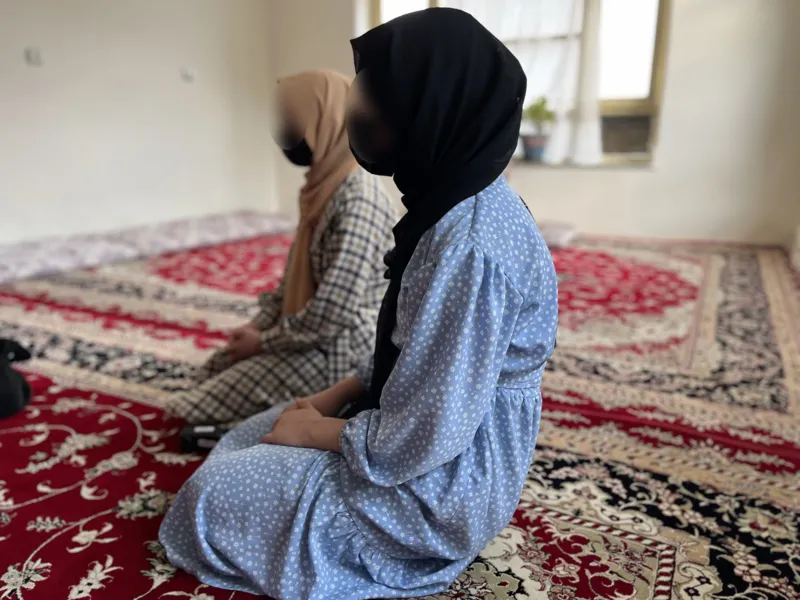Shabana, a teenager living in Kabul, looked forward to her daily English lessons. Riding on a bus with her friends, talking, laughing, and learning something new was a bright moment in her dark life. Since the Taliban took over Afghanistan, the dreams and hopes of countless women like Shabana have been shattered. For her, it wasn’t just about losing the chance to complete her education; it was about losing the essence of her life—the freedom to speak, learn, and live without fear.
In another world, Shabana would be graduating from high school next year and fulfilling her dream of earning a business degree. But in Afghanistan, the harsh reality is different. For the past three years, teenage girls have been denied formal education. And now, with a newly announced law mandating that women are not to be heard outside their homes, even the smallest joys are tinged with anxiety and fear.

“When we go out, we feel scared. When we are on the bus, we feel scared. We don’t dare take off our masks or talk to each other, thinking that if someone from the Taliban hears us, they might stop and question us,” says Shabana. The new decree is another blow to Afghan women, who have faced a relentless series of restrictions since the Taliban returned to power.
Fear on the streets
The new law gives the Taliban’s morality police, the Deputy Ministry of Propaganda of Virtue and Prevention, sweeping powers to enforce their version of a “moral” society. For Afghan women, who have seen their freedoms slowly being taken away, the law feels like the final nail in the coffin.
“If we cannot speak, what is the point of living? We are like corpses walking around,” Shabana lamented. Her words echo the sentiments of many Afghan women, who feel that life under such harsh rules is no life at all. Shabana decided to stop attending her English classes because of the new law. The fear that something might happen if she accidentally spoke out in public was too much to bear. “But then my mother encouraged me to continue,” she says, reflecting the quiet but persistent protests among many Afghan women.
Even if the implementation of such orders is not always immediate or widespread, the fear of what might happen keeps people in check. Self-regulation has become the norm. Women still appear on the streets of Kabul, but now most of them are in loose black dresses or dark blue burqas, their faces covered except for their eyes, a direct result of an order announced last year.
“Every moment, you feel like you are in prison. It has become difficult to even breathe here,” says women’s rights activist Nausheen. Until last year, Nausheen was one of the few who dared to take to the streets demanding women’s rights. But the Taliban’s violent crackdown on protests has all but stopped them.

Suppressed voices and new forms of protest
Nausheen was detained during a protest last year. “The Taliban dragged me into a car and said, ‘Why are you working against us? This is an Islamic system.’ They took me to a dark, scary place and held me there, using horrible language against me. They even beat me,” she recalls, breaking down in tears. “When we were released from detention, we were not the same people as before. So we stopped protesting. I don’t want to be humiliated anymore because I am a woman. It’s better to die than live like this.”
Unable to take to the streets, Afghan women are now finding new ways to express their dissent. Many are posting videos online with their faces covered, singing songs about freedom. The lyrics of one song say, “Let’s be one voice, let’s hold hands and walk together and be free from this cruelty.” It is a quiet form of resistance, a way to fight back against a system that wants to silence them completely.
The Taliban’s justification
Officials like Taliban deputy spokesman Hamdullah Fitrat have justified the new order by saying it is in line with Islamic Sharia law. “The law approved by the supreme leader is in line with Islamic Sharia law. Any religious scholar can check its references,” he claims. However, many Afghan women disagree, arguing that the Taliban’s interpretation of Sharia is a narrow one that is not in line with the spirit of Islam.
Shirin, a teacher who runs a secret school for girls, says, “It is their own interpretation of Sharia. Islam has given both men and women the right to choose whether they want to study and progress or not.” Shirin, like many others, continues her work quietly, often changing locations to avoid identification. “Every morning I pray to God that the day will go by safely. When the new law came out, I explained all the rules to my students and told them that things would be more difficult. But I am so tired of it all; sometimes I just feel like screaming,” she said. “They don’t see women as human beings, but as tools whose sole authority is to be used by the police.”

